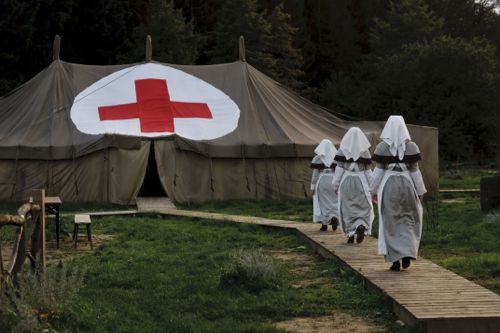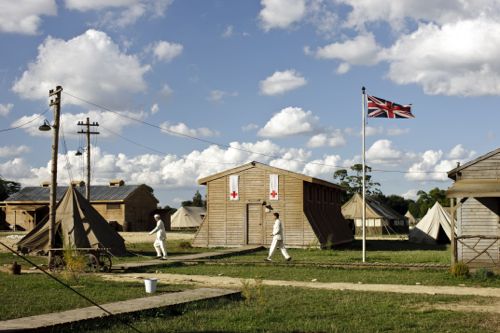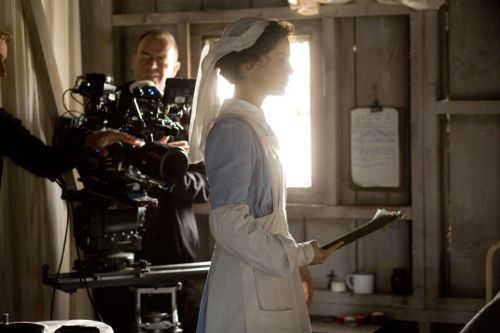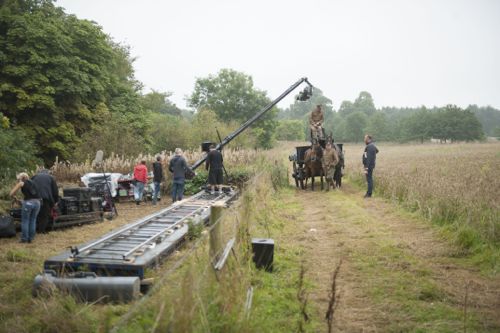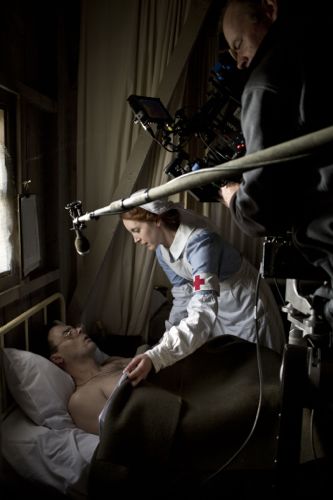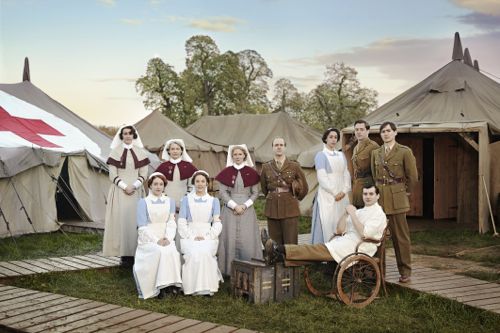“SAVING lives, to save their own.”
The Crimson Field begins on BBC1 at 9pm next Sunday (April 6).
A six episode drama series about volunteer British nurses at a field hospital in northern France.
Part of the BBC’s First World War season, it features a strong cast including Hermione Norris, Suranne Jones, Kerry Fox, Oona Chaplin and Kevin Doyle.
Starting in 1915 with the arrival of new VADs – Voluntary Aid Detachment – to join professional military nurses like Matron Grace Carter, played by Hermione.
With Oona as Kitty Trevelyan, Alice St Clair as Flora Marshall and Marianne Oldham as Rosalie Berwick.
Kevin Doyle is Lieutenant-Colonel Roland Brett, the man in charge of the hospital.
But even he has to answer to others higher up the Army command ladder.
Earlier this month I attended a London preview screening of the first episode plus later series highlights.
You can read my transcript of the post-screening Q&A with the cast plus creator and lead writer Sarah Phelps below.
The Crimson Field explores the horrors of The Great War from a different perspective.
While also shining a light of the lives of women from different backgrounds, their reasons for volunteering and how they cope with what they find just a few miles from the Front.
When they were also facing a time of huge social change.
If you’ve got the time to read the Q&A, it contains some fascinating insights from Sarah and the cast members who took part.
I’ve also added links at the very bottom of the transcript to some of the material they refer to.
BBC Drama boss Ben Stephenson introduced the screening and said:
“The Crimson Field is a really unique way into the First World War that shows it from an angle we probably haven’t seen before. Which is the role of, in the main, the women on the Front Line doing the nursing. A combination of professionals and amateurs who are brought in. So not only is it a real insight into the factual realities of the war but it’s also an imaginative insight into what it’s like to be plucked out of England and thrown into this extraordinary world on the Front Line in France.”
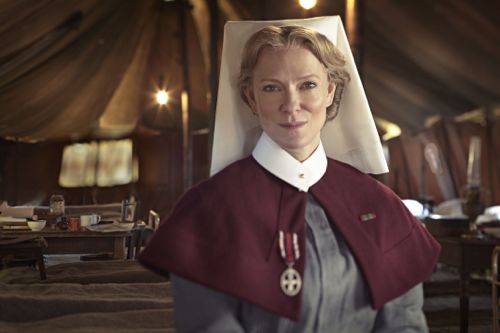
Q&A with Suranne Jones (Sister Joan Livesey) / Hermione Norris (Matron Grace Carter) / Kerry Fox (Sister Margaret Quayle) / Kevin Doyle (Lieutenant-Colonel Roland Brett) / Sarah Phelps (Creator and lead writer).
Chaired by James Rampton, with other cast members in the audience.
Q: Sarah – tell us what gave you idea for this great drama in the first place?
Sarah Phelps: “I read a book called ‘The Roses Of No Man’s Land’ by Lyn Macdonald, who is a very eminent historian in every aspect of the First World War. It’s a historical account of the nurses, both military, civilian reservist and volunteer during the First World War at Field Hospitals like the one here, hospitals at home and hospital barges and ships.
“And it sounds really mental because you feel like that you know a lot about the First World War and you know about the casualties and you’re very familiar with a certain series of images of the First World War and the kind of injuries and the casualties and the terrible deaths. And yet my brain hadn’t made that kind of leap into, ‘Well I knew all this stuff happened but I never even thought about the women who had done the nursing.’
“So this book really opened a door into this subject matter and on to both the military nurses and also on to these girls who came from these Edwardian drawing rooms and were thrown into this extraordinary, explosive and horrifying and exhilarating world.”
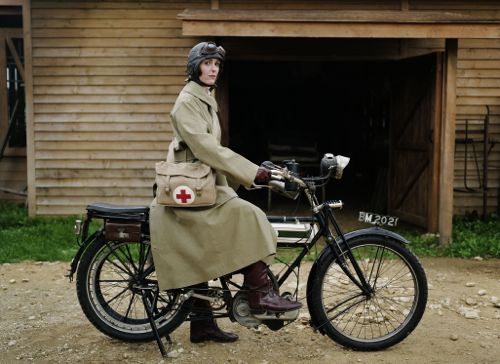
Q: Suranne – when you first read it, what appealed to you about this?
Suranne Jones: “Well, firstly I loved the scripts. So when I went to the meeting and David (Evans), who had directed me in Unforgiven, was there I got very excited. And I think when I left the room I said, ‘Oh, good luck with this.’ Thinking I’d just watch it, anyway, whether I got the part or not. Because I just thought it was beautiful. The way Sarah just drew the characters.
“I remember I read a book called ‘A VAD in France’ and Sarah told me to read a book about Mairi Chisholm and Elsie Knocker and it was wonderful. Then Sarah called me, because obviously I’m just at the end of ep one (when her character arrives)…and Sarah spent 20 minutes on the phone telling me what would happen in the rest of the episodes…and didn’t breathe once. At the end of the conversation she went, ‘Are you still there?’ And I was like, ‘Yes, I’m still here. Oh my God!’
“Having seen it for the first time, it’s a wonderful mix of the girls and you smile at them and go, ‘Oh my God they’e just experiencing this for the first time.’ And then the heartbreaking stuff with Adam James and Karl Davies – (Colonel Charles) Purbright and (Corporal) Prentice – that makes you think, ‘That’s what it’s about as well.’ I think it’s just beautiful. I really, really enjoyed it and I think Sarah’s wonderful.”
Q: Hermione – was one of the attractions the fact it was a narrative about female contributions to the war. We’ve seen so many stories about the men and the trenches. But this was a different perspective?
Hermione Norris: “I’ve always had a passion about World War One. An absolutely fascinating period of history. A time of huge social change, for women in particular. But, again, it wasn’t really gender based for me. It was Sarah’s script. The characters were so beautifully drawn. It wasn’t about whether this was about the men in the trenches or the women in the field hospital, actually. The characters really spoke to me. Even the stage directions made me cry. And it was quite visceral and real. So it wasn’t gender based. I loved Sarah’s script.”

Q: These nurses are flawed. They are human beings who make mistakes?
Kerry Fox: “Strangely, I came at it from a different angle and David (Evans – one of the directors) turned it around for me…I love the fact that Margaret is so bitter and foul. She is such a cow. So I had a ball doing it. It’s also quite rare to have scenes between or among women. It gets rarer. And the joy of that was really fulfilling.”
Suranne Jones: “With different ages and different social backgrounds, all in one place. Because these people wouldn’t meet and it’s under this circumstance that they meet. I think it was great.”
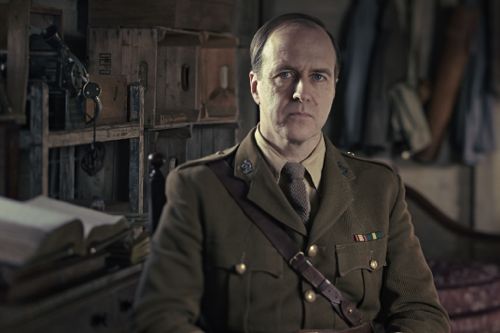
Q: Kevin – there are no goodies and baddies in this?
Kevin Doyle: “I think that’s something that David wanted to emphasise from the off. There are pressures on everbody. And you begin to understand the pressures from on high. If you’re born from a certain generation you’re so used to a particular narrative of the First World War, which is ‘Lions led by donkeys.’ And I think we’re beginning to see a different opinion of that being told now. I’m not one to echo the philosophy of Michael Gove but there was certainly something about…there were pressures on everyone. There were pressures on the generals.
“By the time this episode is screened, 1915, the British Expeditionary Force, which was 200,000, we thought we’d walk in there, save Belgium and everything would be fine. The Germans would go back home. But within months the 200,000 soldiers had been killed or captured or wounded and that Army was completely wiped out. And so they had to first of all ask for volunteers, and there were two and a half million volunteers. But then it became about conscription.
“So people were being wounded and dying in such extraordinary numbers that there was no room for people to go back home. Unless you were dying, really. Certainly I began to realise that it’s good to show a different perspective, to show Purbright’s need to get men back. It’s a very important story to tell.”

Q: Sarah – you made the decision not to go to the trenches at all in this series. Why was that?
Sarah Phelps: “Who says we’re not going to go to the trenches?”
Q: Well certainly in the first episode?
Sarah Phelps: “One of the things that was really important – from a production point of view you have to have a fixed set. You have to have somewhere where we can get used to or we can go to our world. If we go to the trenches, that’s not to devalue what’s going on there. But we can’t go there with our women. Women didn’t go into the trenches. You could have them a step back at the casualty clearing station and at the field hospitals.
“But if we go to the trenches, we don’t go with the majority of our characters and we lose telling this side of the story, which I think hasn’t been told. There’s no reason why we can’t go to the trenches if we get series two…” (laughter)
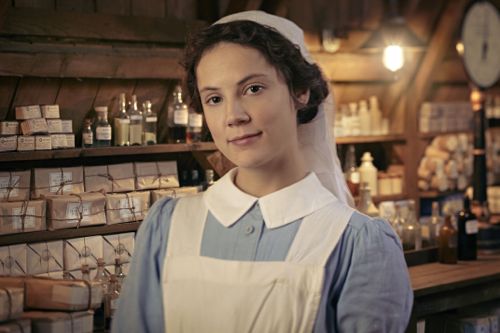
Q: Suranne – could you talk a bit about your character because she comes in at the end of the first episode? Could you fill in her background a bit and how she fits into the jigsaw of the hospital?
Suranne Jones: “She’s a reservist from Liverpool and she’s never worked in an Army hospital. But she arrives in France. She’s told the girls that she doesn’t have a partner but obviously we’ve just seen that she is wearing an engagement ring. So we will find out a little bit more about who is her partner.
“She rides a motorcycle, she’s had her hair chopped off. She’s quite modern. She’s a suffragist and she’s a very modern forward thinker. She thinks it’s wonderful that there are VADs and that they should have more work and more chores and more hands on.
“That clashes with, particularly, Margaret’s rules and regulations. So she causes a bit of stir. And then we will find out about her background which I’m not really allowed to say…no spoilers.”
Q: Hermione – could you fill is in a bit on your character? She seems very pursed-lipped and quite severe but, obviously, that’s never the full picture, is it?
Hermione Norris: “No. Grace has been recently appointed Matron and I think episode one shows her wrangling with the difficulty of embracing that authority. She has been very much Margaret’s protege and has been quite manipulated by Margaret over the years. We find out everybody’s manipulated by Margaret. Something in a name.
“So you see her being stringy-lipped and strict and a disciplinarian, which was absolutely required. To have discipline and a correct uniform in amongst such carnage, I think the rule was that that made everybody feel safe. But you very much see Grace’s compassion and here struggle with the decisions that she has to make as Matron. As the story moves along, more and more so.”
Q: Kerry – in some ways then, is it like any other workplace drama with the tensions and rivalries that are always visited. Is that an element of it?
Kerry Fox: “It’s quite interesting watching that (the episode) now because sometimes you think that rivalry and bitterness and the fake camaraderie, friendship between women, seems a lot more interesting often than we get the chance to see between men. It isn’t so submerged and hidden and complicated. So there’s a lot more of that, really. Of course Margaret is sweet and innocent and loving and kind and warm and supportive and generous and works really hard.” (laughter)

Q: Kevin – it was a time of immense social change, within three years women over 30 got the vote for the first time. Do you think that’s reflected in the drama as well? The end of the Edwardian era, the end of the British Empire? All those elements in there?
Kevin Doyle: “Yes. It was a massive catalyst for change. There were a lot of pressures before the war for women’s suffrage and the contribution that they made during the war, back home, in the hospitals, it spoke very eloquently to the Establishment about the rightful place for women in the workplace. It had a massive bearing on the next generation. They began to feel the change when they got back home.”
Q: Did you want to bring that in to the drama, the backdrop of what was happening in Britain, the cataclysmic social changes that were occurring?
Sarah Phelps: “I did a lot of research about what Britain was like before the war. I wanted to read a lot about the Edwardian period before, so I knew what kind of world everyone was coming from. I read loads of stuff. Edwardian ladies’ diaries and all their experiments.
“They were so bored. There was a kind of like End of Days scenario, like the last days of the Roman Empire. They weren’t exactly throwing members of their family on to the rocks in Capri but they were so bored. There was a sense of something glorious having been ended with Victoria’s reign, the end of the 19th century and they’re all waiting for something to explode and catapult them into the next stage.
“I read all these Edwardian ladies’ diaries and they used to have morphine parties and have their friends round. A nice cup of Lapsang Souchong and a bit of gossip about who’s got the best hat and then they’d roll up their sleeves and give each other injections of morphine. I read one lady – she experimented with Chloroform. And she’d say, ‘Oh dear old Chloro, dear old familiar friend.’
“This was an absolutely schizophrenic society. Sexually schizophrenic, bored and there’s almost a level of depravity in how bored they are. And at the same time, malnutrition and poverty which is absolutely unimaginable.
“There’s a really shocking statistic from medical officers and recruiting officers when they had all these young guys volunteering to go to war. Not always from patriotic duty but a job, money in their pocket, a pair of their own boots, a nice good bit of cloth on their back, a gun, off in a foreign country with your mates, a sexual freedom and licence that they would never have at home. Three meals a day. And there’s an amazing statistic which just shocks you to your core about the level of serious malnutrition in volunteers coming forward. Not your communal garden malnutrition – bad teeth and a bit skinny. Serious malnutrition.
“Those two extremes. You’ve got to remember that the world that they were coming from, in 1905 you’d already had a revolution in Russia which had scared the crap out of people at home. By the time we’re in 1915 we’ve already got Gandhi in India organising the protests against the Land Taxes. We have, in this period, the absolute seeds of the end of Empire, right now when they’re all fighting for Empire.
“Everybody in the world comes to this line, to the Western Front, everybody in the world. It’s incredible. I’ve found photos of Zulu warriors at the Western Front. They were there. 1918. And it’s extraordinary that at this time when everyone’s talking about Empire and who is on who’s side, the absolute seeds of the end of it are now flourishing – in Ireland, in India, everywhere. It has obsessed me.
“But we’re talking here about women getting the vote. It was kind of a trade off because no-one went, ‘Up the women,’ in 1918. They were all back, barefoot and pregnant in the kitchen so the men can have the jobs back. So let’s not kid ourselves.”
Q: Suranne – it’s an amazing set. Can you talk a bit about it and did help you to get into character?
Suranne Jones: “Yeah. We went for a read through and it was half built and we were in one of the huts. And so we could see what was about to be built by the wonderful crew. And then we went back a couple of weeks later…well, the guys had started two weeks before me actually because Joan comes in later. When I got there it was just amazing because they planted actual corn..wheat…”
Sarah Phelps: “A strain from a hundred years ago so it looked right.”
Suranne Jones: “When I first got the job I thought, ‘Great, I’m going to France!’ And then I got on a train to Wiltshire. But it was beautiful. So where the cemetery was they planted wheat – a hundred year old wheat. Then we would have tents. So the scale and the depth of what the cameras could catch was absolutely amazing.
“And then, of course, we’d have the main hospital. Add on to that your carts and horses and vintage vehicles – we were getting out of our trailers every day and it was very easy to just walk down to the field and be in our uniforms in the actual place. So thank you to all the wonderful crew. It was beautiful.”
Kevin Doyle: “It must have been months before – they built an allotment for the camp kitchen. I don’t know if it was ever seen. But it just looked beautiful. The field of corn – it’s only used in one scene. We’re walking by on the way and back from a cemetery. And there are two or three guys scything the wheat. It’s just for that moment. But they planted it months in advance. Having that kind of expertise.
“When you went into the pharmacy or the wards, just the level of contribution from the art department was just extraordinary. Everything was there that you needed. If we were trained doctors we could have taken people in. It was extraordinary. So hats off to them.”
Suranne Jones: “And also the fact we started in summer, so we had wasps everywhere. Then we went into fields of mud and then rain and wind. So our dresses, for the nurses, were covered in mud up to here. We went through all that. And the set just got better and better looking. It was amazing.”
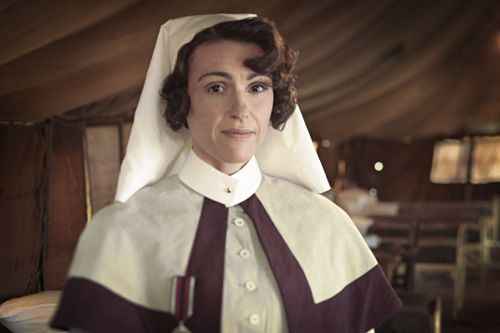
Q: Why are we still so fixated by the First World War?
Hermione Norris: “For me – I can’t speak for anyone else – but it’s a generation that I remember. I remember the smell of that generation, the attitude of that generation. And I think the scale of loss and devastation is beyond comprehension.
“I became interested in it about 20 years ago, I suppose, and read the Pat Barker trilogy and went to Flanders. Just the psychological effect and impact on us as a nation, I think we’re still living in the consequences of that. When Sarah’s script came along…‘We will remember them’…it was just on a very small scale from my point of view, a small act of remembrance every day. ‘At the going down of the sun and in the morning we will remember them.’ And you really did feel that there.
“I hope for people on a Sunday night it’s a small act of remembrance. ‘Small’ without sounding pompous or sombre about it. It was a hugely significant war and it was a huge privilege to be a part of that.”
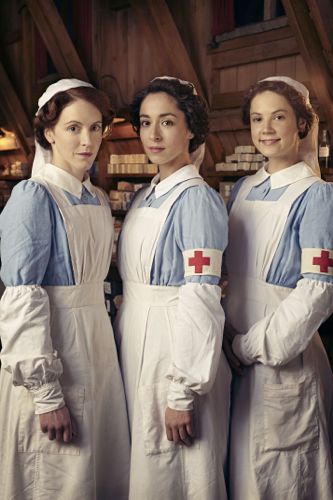
Q: Can I ask about the costumes. Did they also help to get into the characters?
Alice St Clair, who plays Flora Marshall: “Yes, they really did. Mainly because the corsets were quite restricting and you couldn’t believe that you had to do all the work – we only had to do it in the scene, like the bed making scene, which was exhausting. In a corset it was really difficult to bend over even. They were so upright in their beliefs and way of being as well and the costumes really helped you remember that all the time.”
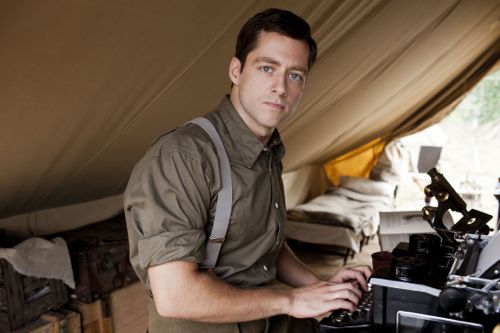
Richard Rankin, who plays Captain Thomas Gillan: “Just going back to discussing the set, it was really easy to immerse yourself in the part and in the environment because the entire set was there. Like Kevin says, you could pretty much start bringing in patients. The level of detail was so great. And then add to that the costumes and the level of detail, it was brilliant.”

Alex Wyndham, who plays Captain Miles Hesketh-Thorne: “Watching that, it was really interesting being the love interest – it wasn’t a man’s story. And I was thinking, ‘Oh gosh, this is what it must be like for all those girls when they go to screenings, ‘Oh yeah, here I come and I just hit on the guy a little bit and then I’m off screen.’ I just was really struck by the strength of it. The women’s stories. Actually drawing the attention to female inter-personal relationships and making them really compelling and dynamic and fascinating. Not just a side story. It was just really wonderful to see women’s stories told incredibly strongly and vibrantly, at the forefront of things.”

James then opened up questions to other members of the media in the audience.
Q: (From me) Following on from what Sarah was saying – was there anything about the day to day lives of the real people who worked at hospitals like this that took you aback or surprised you? That you didn’t expect?
Sarah Phelps: “You don’t even imagine for a moment just how hard they worked. One of the things that took me aback was the fact that the nurses would make a point – if they could – about making sure that dying men were what they called ‘specialled’. That they didn’t die on their own. And that every man would get a letter from that special nurse back to their families. Because obviously if a man died on a field then his commanding officer would generally write to the family. But they’re not in the field, they’re in the field hospital. So you have all these nurses writing back. And at the same time nursing men in the most appalling injuries.
“There’s one nurse’s book, Sister Edith Appleton, who’s quite a girl. And she’s alarmingly chuffed when spies are marched out to be hung and shot. But apart from that she’s fabulous. And she describes – and a lot of nurses and volunteers describe – having to to sit with men who are dying from their injuries. There’s absolutely nothing you can do about it. One of the things that just made me go shivering was about Sister Edith Appleton, sitting next to a patient’s bed, who took upwards of five days to die from an appalling head injury. And her description of listening to him trying to breathe through the brain matter dripping down the back of his throat.
“This is what they did. And made beds. And poured bleach over their hands to get rid of any infection because a grain of dirt under your nail was the difference between a man’s life and his death. So over raw hands you’d pour bleach so that you be aseptic to deal with your patient. Then you would sit by their beds and hold their hands and talk to them as they died. They went without sleep and their hands and feet split.
“Those tents – they lived in them in freezing northern French winters. You’re just staggered. And listening to the description about how many of layers of clothes they had to wear in order just to not freeze to death in their beds. And going to work and having to try and wash men who came from the Front, in those winters, clarted from head to foot in poisonous mud and suffering from hypothermia and God knows what. You’re staggered. Honestly, every single detail of it knocks me off my feet.”

Q: Suranne touched on this a little earlier, about the wet conditions. How difficult did it get? How boggy did it get? And the missing toes that we saw – I wonder what they were in real life?
Suranne Jones: “They used to be kept in the fridge in make up with the ears. So we’d go in to get some milk and the wonderful make up designers and girls that did all the injuries, brilliantly…and there were teams and teams of make up girls when the troops were out…there would be a second make up van that were in at the crack of dawn with all these wonderful supporting artists. So the toes were kept in the fridge.
“Our conditions? When you hear Sarah talk about that and the couple of books that I read, the chilblains and the tiredness…we have to put into perspective that we’re a bunch of actors making a drama and we work long hours and I remember doing a shower scene in the middle of the forest and it was quite cold – it was open top…but you do then have to remember that it ain’t nothing compared to what Sarah’s just described. But it was cold and boggy and we are actors and we do like a moan.” (laughter)

Kerry Fox: The thing that strikes me from reading about it was what Sarah said about – they had nothing. The fall back of their medical care was so limited. Don’t forget that Penicillin was used for the first time in the First World War. Because my children’s great grandfather was one of the first recipients of Penicillin on the beach and he had always said how much it hurt. He thought it was going to kill him. The Penicillin injection was the most painful thing he’d ever experienced – and he’d had half his arse blown off. That was one of the first times it was used. I just always had the feeling that there was so little they could do.”
Sarah Phelps: “At this stage of the war…you think about now what happens with any kind of traumatic injury. You have blood transfusions, you have ways of treating shock. At this stage, not until 1917 did they have any way of storing blood for blood transfusions. It is astonishing when you read the descriptions that anybody survives these kind of injuries. How they survived gas gangrene, how they survived shock, how they survived people coming in with virtually almost no blood left in their body – and they managed to operate on them.
“The anaesthetic at the time is really, seriously brutal. I’ve read descriptions of operations where the only way of giving a man anaesthesia is to basically shove it up his bum. And it’s really alarming. I’m stunned that men made it through. But made it through they did. And the reason they made it through is because of women and men like the ones I’m writing about. That’s how they made it through.”

Q: Could I ask the ladies what it meant to you to play such forward-thinking women? Because this is really the start of women doing proper jobs and being accepted by men. What does it mean to you to play those roles that focus on that?
Hermione Norris: “Obviously that’s a huge privilege. It was a time of huge social change for women. Of course working class women had always worked…but for middle class and the upper class women, as these VADs were, they were doing jobs that were beyond comprehension. Men didn’t think…women probably didn’t think that they were capable of working in a munitions factory, being nurses, working in hospitals, doing any work at all. Literally they were deemed incapable of work like that. So obviously as an actor or as a woman full stop, that is a huge privilege to be a part of that.”
Kerry Fox: “The nurses that we are…at the beginning of the war there were 400 of them and by the end of the First World War there were 4000. There is a storyline later, which I don’t think is a spoiler, but my character is very old school. She sees herself as a soldier. It’s a calling very much like a career and she’s recognised as a soldier – she had worked in earlier wars. So she was that sort of type.”
Hermione Norris: “For the first time women had careers and being a nurse was, I suppose, the first career a woman was allowed to have.”
Suranne Jones: “It’s difficult without Sarah shouting ‘spoiler alert’, for me, but my character…I always try to do jobs, scripts that have some kind of conscience about them and are important. So it was great that this came up. And it was from the women’s perspective. Joan is not only politically forward thinking, socially forward thinking, she sees herself as an equal. She has a love of people and human beings and I think that when you get to episode three and four you’ll see how wide reaching that is. And that was the discussion with Sarah that I had about the end of the series. About how something huge and traumatic that happens to us as human beings can also make you see and bring people together.”
Q: She’s also quite forward thinking in that she’s got short hair and wears trousers. Were you surprised how controversial that was or how that would be seen by other characters?
Suranne Jones: “Yeah. Sergeant Soper (Jeremy Swift), as you saw there. I remember the actor saying to me, ‘You look great, quite sexy, actually.’ But obviously as a character back then he would have been absolutely horrified that this woman turned up in a gentleman’s greatcoat on a bike. Again the costume department…they did a great job. You watch the girls out of uniform, not only when we’re all in uniform, and the detail is wonderful. Although the goggles were made for men. Women have smaller faces so when you put the goggles on they go to either side, like Toad of Toad Hall. So the girls that we had to do the stunt riding couldn’t actually see very well. So it was very dangerous for them. But they did brilliantly. Obviously it wasn’t me!”
Q: To confirm the time and place of the drama?
Sarah Phelps: “We’re in Northern France and we start in 1915 because that was when the first wave of volunteer nurses went over to France. Obviously prior to that they thought it was going to be a two month exercise in spanking the Hun’s arse and sending him home without his tea. And everyone home in time for Christmas.
“By the time that it became violently obvious that not only was this entrenched warfare and that they were swiftly running out of medical personnel to deal with the extraordinary levels of casualties and in time to put the call out in Britain and train all those girls…so this is summer, June 1915. And it’s Northern France. I took some inspiration from a very similar hospital that was based near Etaples. So that’s where we are. About 30 or 40 miles back from the line.”
Q: Sarah – the conditions for all these volunteers, nurses, sound really horrific. What was it that motivated them to go over there?
Sarah Phelps: “So much motivated them. A load of people might have said it’s duty, patriotism, it’s being fired up. But also I think that at a very much deeper level it felt like a door being opened and there are loads of reasons. The same reason that loads of young men were clamouring to sign up to join the Army – for money, for a gun to be with their mates, for a good pair of boots and for adventure and thrill.
“I think a lot of women joined up for the freedoms, for getting out of these bloody claustrophobic drawing rooms where you were expected to behave in a certain way and the pressures were on you to be a wife and a mother or do good works and things like that. And then this thing happened and it was the call, ‘Rise up women of Britain and stand shoulder to shoulder with your menfolk.’
“It must have been like a blast going through the blood. I’d have dropped everything like a shot and gone. Just to do something. See a different country, to wear a uniform, a sense of pride to be active. And adventure and men and friendship and comradeship and all those different things.
“I think there’s loads of reasons why people join up. Lots of people could have put their hand on their heart and said, ‘For King and country,’ and they might have got there and been bloody useless. Some people might have gone, ‘I want to go because I want to meet men.’ And they might have got there and been bloody brilliant. It doesn’t matter why you go. It only matters what you do when you get there.”

